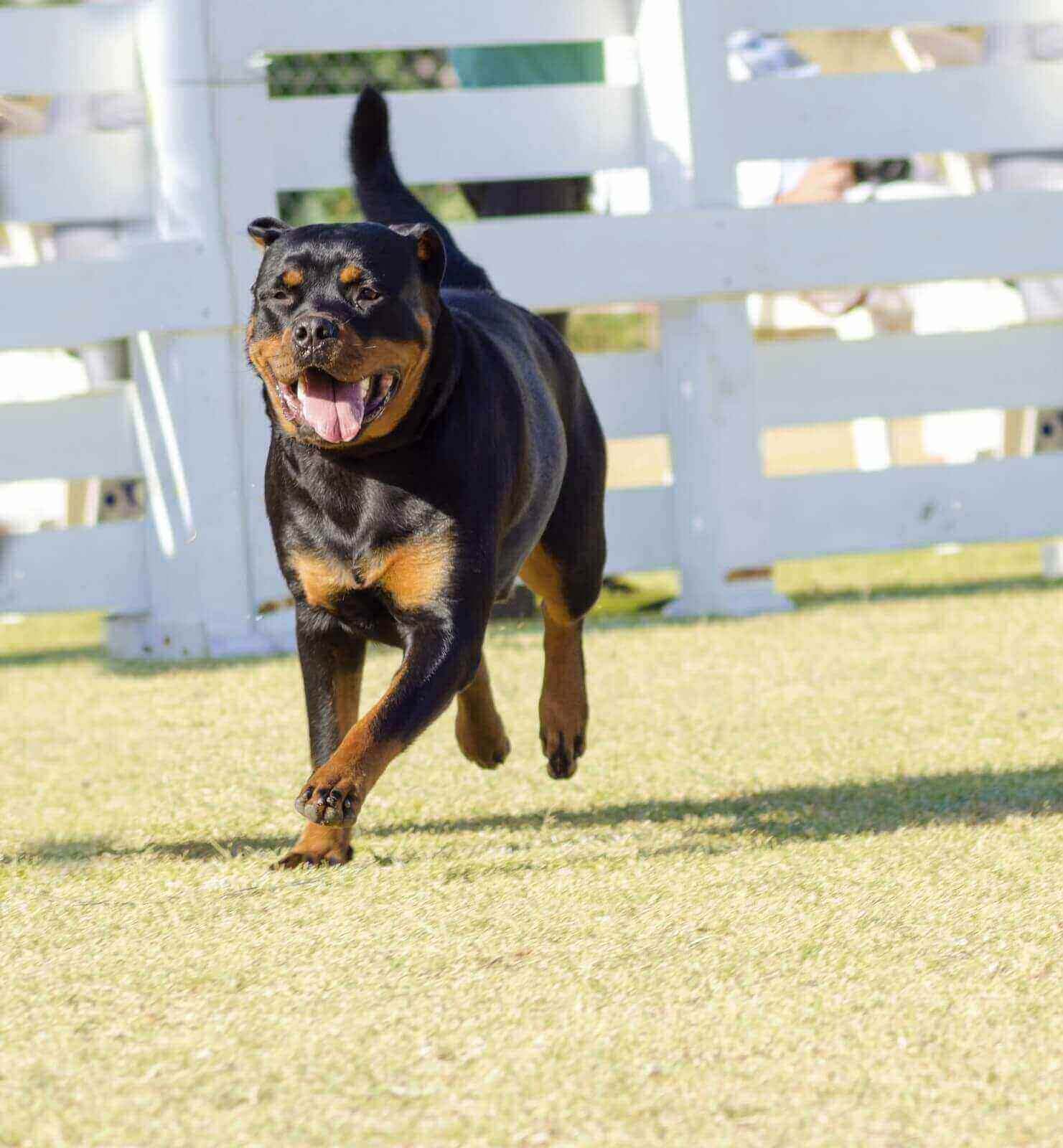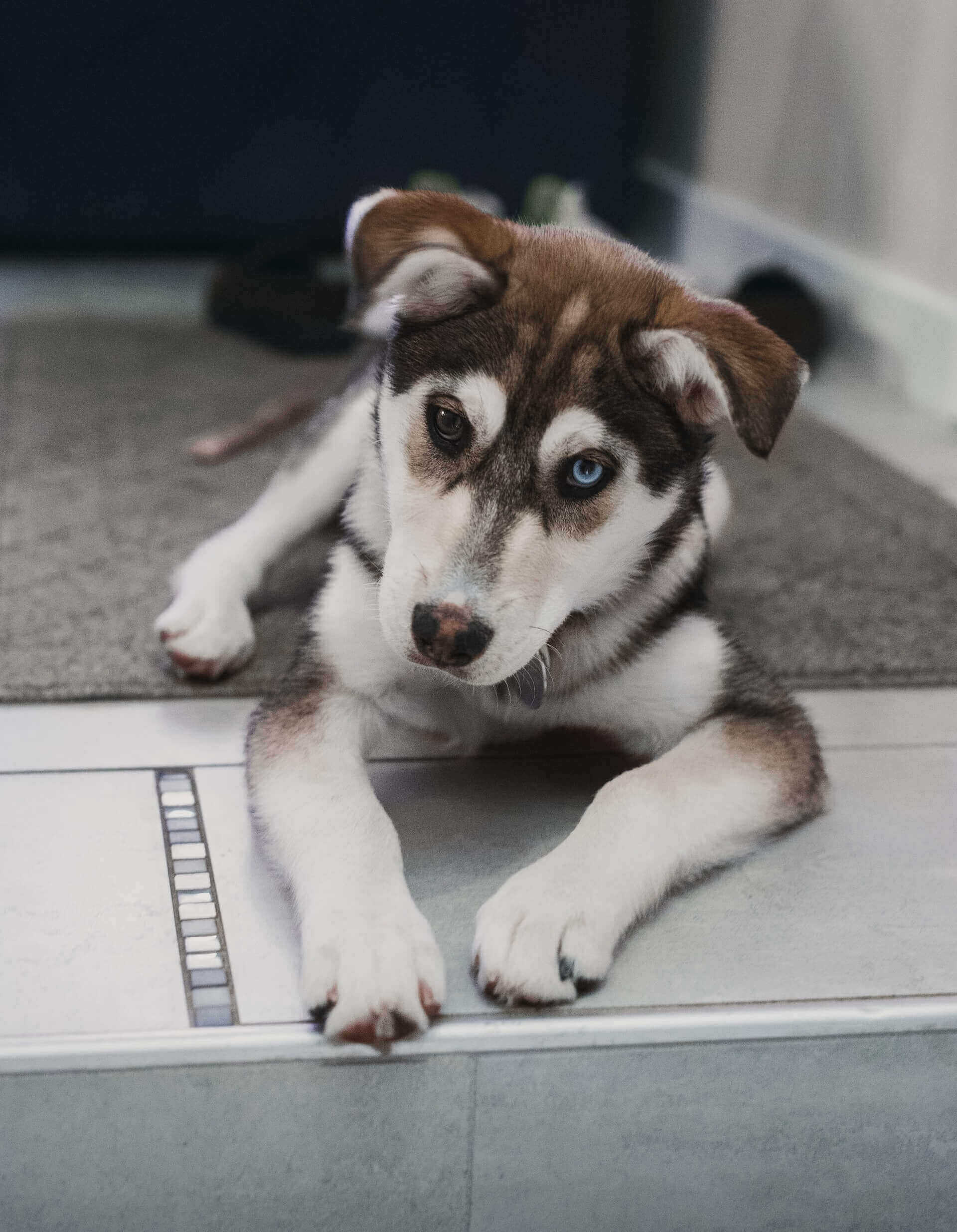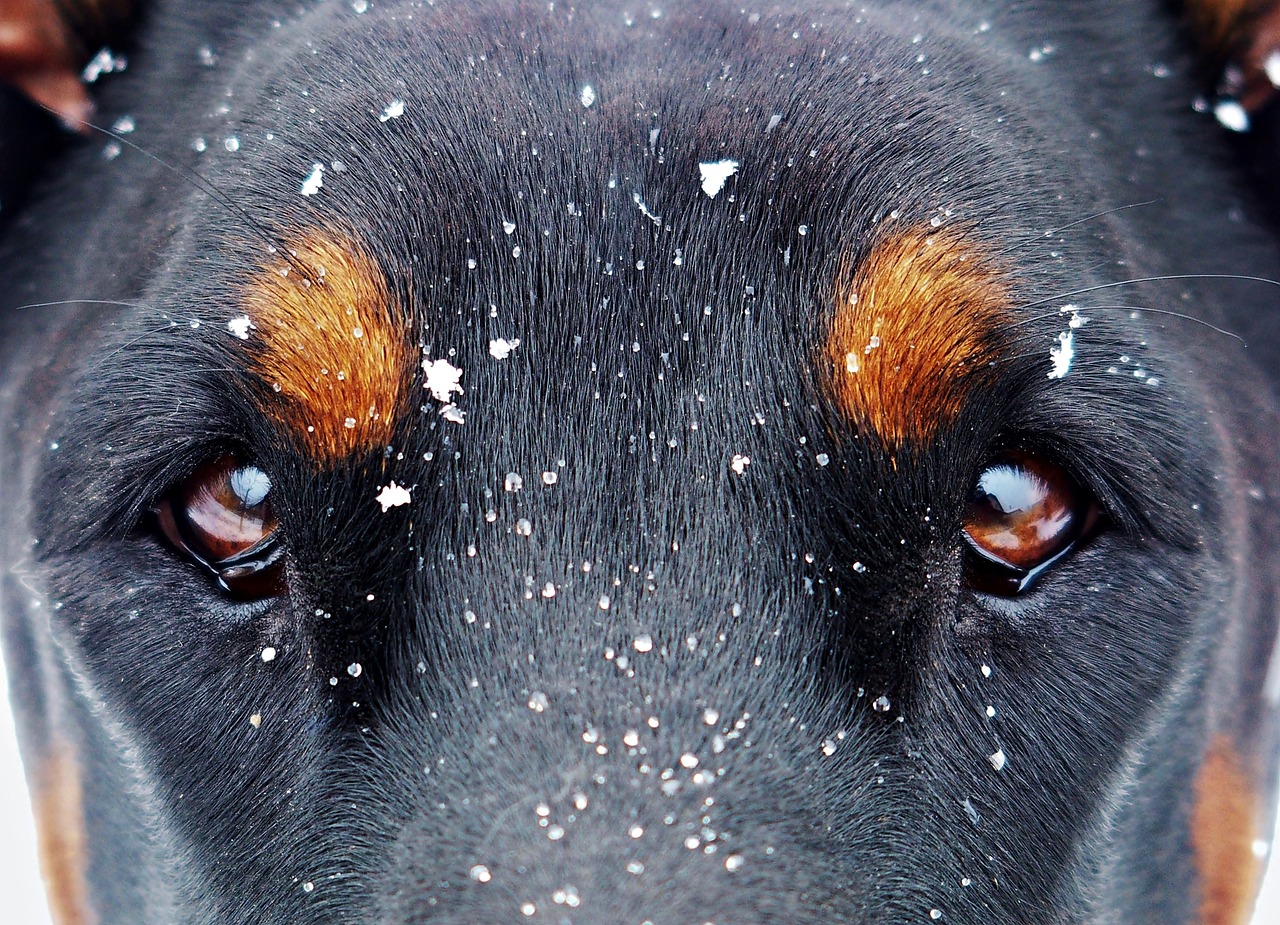Certain dog breeds have toenails that are black. In this article, you will find information on what those dog breeds that have black nails are. You will also find information on why exactly the dogs have black nails.
Dog breeds with black nails include the Doberman, Rottweiler, the Pug and Chihuahua. Others include Labrador Retriever, Dachshund and the Puli. Generally, it is dogs with dark coat colors (like black and brown) that have black nails.
Thus the dogs breeds with black nails are those in which dark coat colors (such as black and brown) are predominant.
It is highly unlikely to find a black nails dog with a very light coat color. But if it is a mixed color dog, with light color upper coat and dark legs, then the nails can be black.

Generally, if you ever find a dog with black nails, it is likely to be a black or brown coat dog. Alternatively, it could be a dog with a lighter coat color in the upper part, but with black/brown legs.
Dogs with black nails can be quite cute. But how do you trim a dog’s nails that are black? This can be a challenge, as in such dogs, it can be hard to tell where the quick starts.
Thus grooming dogs with black nails can be a challenge due to this factor. When grooming such dogs, you always have to start by working out where is the quick on black dog nails?
That can be quite a challenge, when working out how to cut black dog nails.
It can actually get to a point at which you are tempted to stop cutting the nails. Yet you also know what happens if a dog’s nails are never cut.
Why Do Some Dogs Have Black Nails?
We have to start by asking ourselves, are dogs toenails supposed to be black? And the answer is ‘yes’ – it is natural for some dog’s nails to be black.
The dogs that have black nails tend to be those whose coat colors are dark. For instance, if a dog’s coat is black, its nails may also be black. Black nails are sometimes also common in brown dogs.
Thus it is mainly the coat color which determines what dog has black nails.
And if you research on what kind of dog has black nails, most sources will tell you that it is a dog with a dark color coat.
A dog with a light color coat may still have black nails. But this is only likely if, in spite of the dog’s upper coat color being light, the legs are of a dark color.
Thus, for instance, a dog may have an upper coat that is white. Then its legs turn out to be black or brown. In such a dog, black nails may be there.
Ultimately, if you were wondering, why does my dog have some black nails, then that is likely due to the dog’s coat color.
And in figuring out what colour should my dogs claws be, you typically have to look at the dog’s coat color. The lower/legs coat color is particularly relevant.
If the dog’s legs are of dark color (such as black or brown), the nails may be black.
And in a mix color dog, some nails may turn out to be black, while others are white.
This is relevant if you were wondering, why does my dog have some black nails and some white? It could be due to it being a mixed color dog.
Which Are The Dog Breeds With Black Nails?
The dog breeds with nails that are black are typically those in which black and brown coat colors are common.
Thus if you were wondering, what type of dogs have black nails, that is the simple answer.
Yet some people have an interest in knowing which specific breeds of dogs have black nails.
This leads to a question like, does the German Shepherd have black nails? Does the Golden Retriever have black nails? Do Shih Tzu have black nails and so on.
It is in a bid to meet that need that we identified some 7 dog breeds with black nails.
Those dog breeds include Doberman, Rottweiler, The Pug and Chihuahua. You also find the Labrador Retriever, Dachshund and The Puli in this list.
We will now proceed to look at each of these dog breeds in turn.
Doberman
This is one breed in which the solid black coat color is very common. And dogs with such solid black coat color tend to have black nails to match.
If you want a loyal yet still assertive dog, you will likely find it in the Doberman.
The Doberman is also an ideal choice if you want a dog with black nails that doesn’t require lots of grooming. (That is of course with the exception of toe trimming grooming aspect, which has to be regular).
But since the Doberman has quite a short coat, its other grooming needs are rather modest.
Then again, the trouble that the Doberman saves you in grooming needs, it will make up for it in exercise needs. Reason? The Doberman is a rather high energy dog, which requires lots of daily exercise.
Another challenging aspect of owning a Doberman is training. Since this can be quite a fierce dog, it requires lots of training from an early age to be properly manageable.
Ultimately, this is a relatively big lovely dog that often has black nails.
Rottweiler
The Rottweiler is another relatively big dog that often has black nails.
If you specifically want a unique looking dog, with a coarse coat and dark nails, you will find it in the Rottweiler.
This is a dog that is large enough to intimidate intruders. Yet it is also quite sociable.
It has considerable exercise needs, but they are not exceptional. You give the Rottweiler more or less the same amount of exercise you would give any medium to large size dog.
But being a large dog, it requires solid training from an early age. Others it may be unmanageable later.
Further, this being a large dog means that it requires a home with a bit of space to move about.
And being a large dog also translates into greater demand for food…
Ultimately, the Rottweiler can be quite a loving dog. And if you specifically want a large dog with black nails, the Rottweiler is worth considering.

The Pug
For someone who specifically wants a small, funny dog with black nails, the Pug is a good choice.
This is the sort of nice-tempered, highly playful dog most people wouldn’t mind leaving their kids with.
Not only is it affectionate, but it is also entertaining: to the point of being referred to as a ‘clown’ in certain circles.
The good thing about owning a pug is that it won’t require you to spend too much time exercising it. Walking your Pug round the block may suffice on most days.
But one downside to the Pug is in its tendency to shed a great deal. This can translate into expensive grooming needs. And it can make it unsuitable for people with certain allergies.
Another downside to the Pug is in its relative clinginess. This is a dog that, without proper remedial measures, may be prone to developing issues like separation anxiety.
All in all though, the Pug is a funny little dog that often has nice black nails.
Chihuahua
If you want a truly small (pocket-size) dog that has black nails, you may find it in the Chihuahua.
This is a small, yet quite intelligent dog that makes for an interesting companion.
It is also the sort of dog you can keep even if you live in quite cramped quarters.
The only downside you may find in the Chihuahua is in its relative fragility. After all, this is a ‘toy dog’ in the realest sense.
Otherwise in terms of things like feeding needs and grooming needs, this dog’s requirements are modest.
And given its intelligence, this is an easy to train dog. That too should count for something.
In the end, if you want a truly small dog with black nails, you won’t go wrong with a Chihuahua.
Labrador Retriever
Not all Labrador Retrievers have black nails. But those with black coats often end up with black nails.
Even those with other upper coat colors may have black nails, if their legs are black or brown.
If you want a dog in which the combination of high energy and high intelligence is present, then the Labrador Retriever is ideal.
This is a medium to large dog, which is thankfully easy to train and quite affectionate.
The only challenging aspect you may find in the Labrador Retriever is with regard to its high exercise needs.
But regarding other aspects of care – grooming, feeding and so on – the Labrador Retriever is not too demanding.
Dachshund
If you want a small to medium size dog with black nails, you may find it in the Dachshund.
This is also a dog that has a ‘mind of its own’, and which may challenge your wits once in a while. It can therefore be ideal if you don’t necessarily want a ‘yes dog’.
The Dachshund’s feeding, exercise and grooming needs are not exceptional.
In spite of ‘having a mind of its own’ the Dachshund is still quite sociable, and its appearance is always lovely.
The only aspect of Dachshund ownership you may find challenging is that of training. After all, this is a ‘dog with a mind of its own’, which may prefer to do this in certain ways.
The Puli
If your preference is for a ‘dreadlocked’ dog with black nails, then you will find it in the Puli.
The combination of dreadlocks and black nails in this dog gives it a very unique look.
Whereas it is not a very huge dog, the Puli is full of energy. To give a healthy outlet to this energy, you will need to design a good exercise regime for the dog.
Otherwise in the Puli, you find a cute, loving and truly playful dog with outstanding looks.
What Does It Mean If Your Dog’s Nail Turns Black?
So far, we have been dealing with dogs that have black nails since birth. So these are dogs with black nails since puppyhood.
But there are other cases in which a dog’s nails turn black when they are grown. So you find a dog that has always had white nails now has black nails!
That can get you wondering, what do black nails on a dog mean in this case? Why do dog nails turn black? Is it a disease? And if so, exactly why would a dog get a black nail and how is it treated?
These can be difficult questions, especially if you see your dog’s nail color changing right before your eyes.
So, indeed, what do black dog nails mean in this context?
In some cases, the dog nails may turn black due to natural changes in the dog’s pigmentation. Thus in some cases, a dog’s nails turning black is natural.
If you were wondering, why does my dog have pink and black paws, this may be one of the possible explanations.
But there are also cases in which the dog’s nails turn black due to an infection. For instance, a dog that keeps licking its nails may eventually develop an infection that causes them to turn black.
Thus if you were wondering, what does a black dog nail mean, this is another possible answer. It may mean that an infection is developing in the nail.
This may be treatable (by a vet) using antibiotics, antifungal or other meds: depending on the underlying pathogen.
Final Verdict – Dog Breeds With Black Nails
Dog breeds with black nails include the Doberman, Rottweiler, The Pug and Chihuahua. Others would include Labrador Retriever, Dachshund and The Puli.
Normally, it is the dog’s coat color that determines the dog’s nails color. In dogs with light coat colors, the nails tend to be white. But in dogs with dark coat colors (such as black and brown), the nails may be black.

If a dog with a light coat color happens to have legs whose color is dark (like black or brown), then black nails can be present in that dog too.
The puppies of dogs that will eventually have black nails may be born with light colored nails. Then those nails darken with time.
It is also possible for the nails of a mature dog that were previously white to turn black. This may be due to natural changes in the dog’s pigmentation. But it can also be a sign of an infection developing in the nail.
As a pet lover, make sure to learn about pet more and give your pet dog a good and comfortable life!

Welcome to Learn About Pet. My name is Rajkumar Ravichandran and I love all pets, travel, and amazing food. I write about my passion and personal experience caring for multiple pets in this blog! ❤️
Post Disclaimer
DISCLAIMER: THIS BLOG OR WEBSITE, "Learn About Pet", DOES NOT PROVIDE YOU WITH MEDICAL ADVICE AND IS NOT A SUBSTITUTE FOR MEDICAL ADVICE. ALWAYS GET IN TOUCH WITH YOUR PERSONAL VETERINARIAN AND USE INFORMATION HERE AS GENERAL ADVICE.
The information, including but not limited to, text, graphics, images and other material contained on this website are for informational purposes only. No material on this site is intended to be a substitute for professional veterinary advice, food recommendation, diagnosis, or treatment. Always seek the advice of your veterinarian or other qualified health care provider with any questions you may have regarding a medical condition or for pet food related questions.







